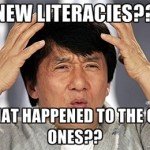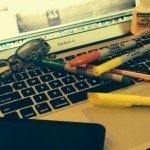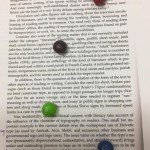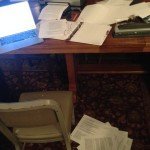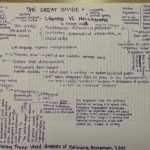
Ramblings about Literacy and Composition
As someone who is studying literacy and language as my pathway in the English graduate program, I have been enjoying my literacy course way too much. I’ve been waiting years to study literacy and work with it in a meaningful way. I am also taking a course on teaching composition which is working pretty hand in hand conceptually with my literacy course, go-figure. A few weeks ago, Kim Jaxon brought up the fact that most of us in her course obviously value literacy in some meaningful way because we were English majors. I started thinking about how I am at odds with myself in many ways when it comes to my values with English and composition, and with what I know about literacy.
What I know about my values with English and composition is that I think writing does something that is valuable, but I have also come to realize that composition isn’t just made up of written literacies; it is made up of a combination of written, oral, visual, and technological literacies. In the United States, and at least locally, these four literacies make up what I consider to be functional literacy. Technological literacies are the mediums in which the written, oral, and visual can come to life. One thing we have discussed in our course is that there are rising standards in literacy, and I want to make the claim that these standards are made up of these four literacies. Moreover, these literacies are what composition is all about. The act of making anything whether that is writing, making a film, or a photo montage are all literacy practices which are also acts of composing. In Yancey’s “Made Not Only in Words: Composition in a New Key”, she refers to composition as something that involves the oral, print, and screen, and composition education is the gateway to learning how to use these daily communicative, social, and intellectual literacy practices. She also states that if we don’t learn to expand our definition of composition then we risk becoming irrelevant. Essentially, we live in a time and place in which literacy is valued because it opens up opportunities for people that they may lack without those particular literacy skillsets. Composition is a course that is used remedially to teach a general literacy practice that can be used across and through literacy events.
Through composition, a teacher becomes a sponsor for their students’ literacy learning and enactment of their knowledges. Having such an important role, a teacher needs to be aware of their responsibility and decisions with how they teach their students, I call this metasponsoricalawareness. What I know is that when it comes to literacy it is influenced by a variety of things: location, university, professors, teaching practices/style of instruction, resources, platforms, audience(s), collaboration/isolation, public/private, mode(s), socioeconomic status, religion, history, etc. With that in mind, there is a quite complex set of factors that must be taken into consideration when teaching something like composition, and it requires a lot of reflection and consideration.
I also want to add that literacy does do some stuff, and I want to say that it communicates ideas, constructs identities, and creates community in ways that vary depending on the local and global literacy practices and events. While one does not need these things to participate in the world, I think they are not able to participate in the world in the same way as someone who has consistently expanding literacy skillsets. I know that personally I can participate in circles and conversations that I could not have prior to starting college. While one does not need to go to college to develop these skills, it is still something that has informed my identity. I have constructed who I am through the literacy practices and platforms that I have engaged in. My point is that, yes literacy matters, but I disagree that it is needed to live one’s life and be successful. At the same time, most things and jobs need a certain level of literacy capability. I just simply think that one can’t have the types of access they could have without having a certain level of literacy. My side note is that there are literacy specific sets of skills that are needed depending on ones path in life, and this ultimately should inform what a person learns and does with literacy.
